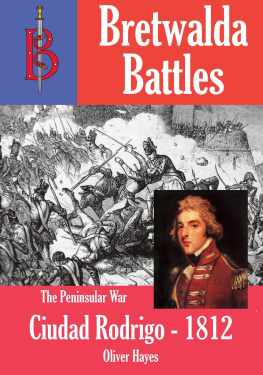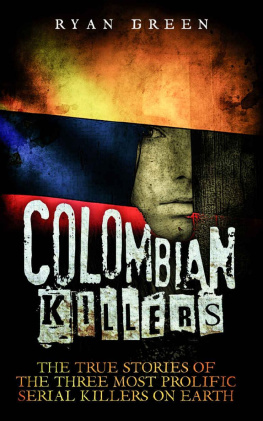Rodrigo Camargo de Godoi - Francisco de Paula Brito
Here you can read online Rodrigo Camargo de Godoi - Francisco de Paula Brito full text of the book (entire story) in english for free. Download pdf and epub, get meaning, cover and reviews about this ebook. year: 2020, publisher: Vanderbilt University Press, genre: Detective and thriller. Description of the work, (preface) as well as reviews are available. Best literature library LitArk.com created for fans of good reading and offers a wide selection of genres:
Romance novel
Science fiction
Adventure
Detective
Science
History
Home and family
Prose
Art
Politics
Computer
Non-fiction
Religion
Business
Children
Humor
Choose a favorite category and find really read worthwhile books. Enjoy immersion in the world of imagination, feel the emotions of the characters or learn something new for yourself, make an fascinating discovery.

- Book:Francisco de Paula Brito
- Author:
- Publisher:Vanderbilt University Press
- Genre:
- Year:2020
- Rating:4 / 5
- Favourites:Add to favourites
- Your mark:
- 80
- 1
- 2
- 3
- 4
- 5
Francisco de Paula Brito: summary, description and annotation
We offer to read an annotation, description, summary or preface (depends on what the author of the book "Francisco de Paula Brito" wrote himself). If you haven't found the necessary information about the book — write in the comments, we will try to find it.
Francisco de Paula Brito — read online for free the complete book (whole text) full work
Below is the text of the book, divided by pages. System saving the place of the last page read, allows you to conveniently read the book "Francisco de Paula Brito" online for free, without having to search again every time where you left off. Put a bookmark, and you can go to the page where you finished reading at any time.
Font size:
Interval:
Bookmark:

Francisco de Paula Brito
Francisco de Paula Brito
A Black Publisher in Imperial Brazil
RODRIGO CAMARGO DE GODOI
Translated by H. Sabrina Gledhill
VANDERBILT UNIVERSITY PRESS
Nashville, Tennessee
2020 by Vanderbilt University Press
Nashville, Tennessee 37235
All rights reserved
This book is printed on acid-free paper.
Originally published in Brazil as Um editor no imprioi: Francisco de Paula Brito (18091861), copyright 2016 by Rodrigo Camargo de Godoi
Cover images: details from Praa da Constituio; the signature of Captain Martinho Pereira de Brito, Paula Brito's grandfather; portrait of Francisco de Paula Brito by Louis Alexis Boulanger (1842, courtesy of the IHGB); a portrait of Simao the mariner (1853, courtesy of the IHGB); Dous de Dezembro press plan; and Constitution Square shortly after the unveiling of an equestrian statue of Pedro I
Library of Congress Cataloging-in-Publication Data
Names: Godoi, Rodrigo Camargo de, author. | Gledhill, Sabrina, translator.
Title: Francisco de Paula Brito : a black publisher in imperial Brazil / Rodrigo Camargo de Godoi, ; translated by H. Sabrina Gledhill.
Other titles: Editor no Imperio. English
Description: Nashville : Vanderbilt University Press, [2020] | Includes bibliographical references and index.
Identifiers: LCCN 2020019523 (print) | LCCN 2020019524 (ebook) | ISBN 9780826500168 (paperback ; acid-free paper) | ISBN 9780826500175 (hardcover ; acid-free paper) | ISBN 9780826500182 (epub) | ISBN 9780826500199 (pdf)
Subjects: LCSH: Brito, Francisco de Paula, 18091861. | Publishers and publishingBrazilRio de JaneiroBiography. | Publishers and publishingBrazilRio de JaneiroHistory19th century. | Poets, Brazilian19th centuryBiography.
Classification: LCC Z521.3.B75 G6313 2020 (print) | LCC Z521.3.B75 (ebook) | DDC 070.5092 [B]dc23
LC record available at https://lccn.loc.gov/2020019523
LC ebook record available at https://lccn.loc.gov/2020019524
In memory of Joo Batista de Godoy, my beloved grandfather.
Ive seen Daddy sad because nobody buys what he writes. He studied hard and still studies hard, and the other day he had a fight with Lalau, who makes his bookhis books, because Daddy has written lots and lots of bookson the machinethose men who make our books on machines are called publishersbut when Lalau isnt here, Daddy calls Lalau all sorts of names that I cant repeat.
HILDA HILST, O caderno rosa de Lori Lamby (So Paulo: Globo, 2005), 19.
Contents
Foreword to the Brazilian Edition
JEFFERSON CANO, Department of Literature, University of Campinas (Unicamp)
WHEN FRANCISCO DE Paula Brito died, the young journalist Machado de Assis devoted his Comments of the Week column in the Dirio do Rio de Janeiro to his friend:
Yet another! This year must be counted as an illustrious obituary, where everyone, friend and citizen, can see inscribed more than one name dear to the heart or soul.
Long is the list of those who, in the space of these twelve months, which are about to expire, have fallen into the tremendous embrace of that wanton who, as the poet said, does not discriminate her lovers.
Now it is a man who, due to his social and political virtues, his intelligence and his love of work, had achieved widespread esteem.
He began as a printer and died a printer. In that modest role, he enjoyed the friendship of everyone around him.
Paula Brito set a rare and good example. He had faith in his political convictions, sincerely believing in the results of their application; tolerant, he was not unjust with his adversaries; sincere, he never compromised with them.
He was also a friend, above all a friend. He loved young people because he knew that they are the hope of his homeland, and because he loved them, he extended them his protection as much as he could.
Instead of dying [and] leaving a fortune, which he could have done, he died as poor as he was in life, thanks to the extensive employment he gave to his income and the generosity that led him to share what he earned from his labor.
In these times of selfishness and calculation, we should mourn the loss of men who, like Paula Brito, stand out from the common mass of men.
Half a century later, another statement, this time from the memoirs of Salvador de Mendona, would become an almost obligatory reference about the role of Paula Brito in mid-nineteenth century Rio de Janeiro:
In Largo do Rocio [also known as Praa da Constituio], outside Paula Britos establishment, across the street, there were two benches where, on Saturday afternoons, the following individuals would get together regularly to converse about literature: Machado de Assis, then a clerk at Paula Britos bookstore and press; Manuel Antnio de Almeida, a writer for the Correio mercantil and author of Memoirs of a Militia Sergeant; Henrique Csar Muzzio, a physician without a clinic and highly esteemed theater critic; Casimiro de Abreu, poet and clerk in a retail establishment; Jos Antonio, treasury employee and author of the humorous Lembranas [Memories] and, finally, this writer, then a preparatory school student. Many times, as he walked from Paula Britos shop to his own home across the square, Joaquim Manuel de Macedo, the creator of the Brazilian novel, would come and sit with us, honest and sincere, and more than once he was accompanied by Gonalves Dias, with his lean body, melancholy aspect, and genial gaze, and Arajo Porto-Alegre, with his bear-like physique and the perennial youthfulness of a healthy soul and body.
Those who compare these two quotations today can easily see how time has imposed on Paula Britos memory a different meaning from that which was still present in Machado de Assiss affectionate recollection of him. The publishers political virtues seemed to have been permanently erased, along with his image as the protector of youth. Indeed, Paula Britos importance during that period seemed no longer to be found in himself but in those with whom he interactedthe most outstanding figures on the literary scene of his time and the future. His was almost a name that hitched a ride in the footnotes of literary history, solely because he kept good company.
Nothing could be more unfair. The book the reader is now perusing reveals a man with a career so rich that historians rarely have the good fortune to find his like; a man who, if he were a fictional character, would be what Lukcs called a type, in which all contradictionsthe most important social, ethical, and psychological contradictions of a timeare linked in a single living unit. But Paula Brito was not a fictional character, and Rodrigo Camargo de Godoi is no Balzacdespite a reference here and there. He is a historian who is well up to the task imposed by his subject.
All contradictions seems like an overstatement, but it is not. The decades between 1830 and 1860 were rife with contradictions, and it is hard to think of any that did not have a deep impact on Paula Britos life. The intersection of racial and political identities when both were formed through the press would find in a printer descended from slaves a focal point around which the most significant tensions of his time emerged. The intersection of the individual with his enterprising ambitions and dreams and the flow of capital that was seeking new outlets after the definitive end of the transatlantic slave trade would give the publisher opportunities to rise and fall, test the limits of protection, and experience the vicissitudes of speculation.
Font size:
Interval:
Bookmark:
Similar books «Francisco de Paula Brito»
Look at similar books to Francisco de Paula Brito. We have selected literature similar in name and meaning in the hope of providing readers with more options to find new, interesting, not yet read works.
Discussion, reviews of the book Francisco de Paula Brito and just readers' own opinions. Leave your comments, write what you think about the work, its meaning or the main characters. Specify what exactly you liked and what you didn't like, and why you think so.










